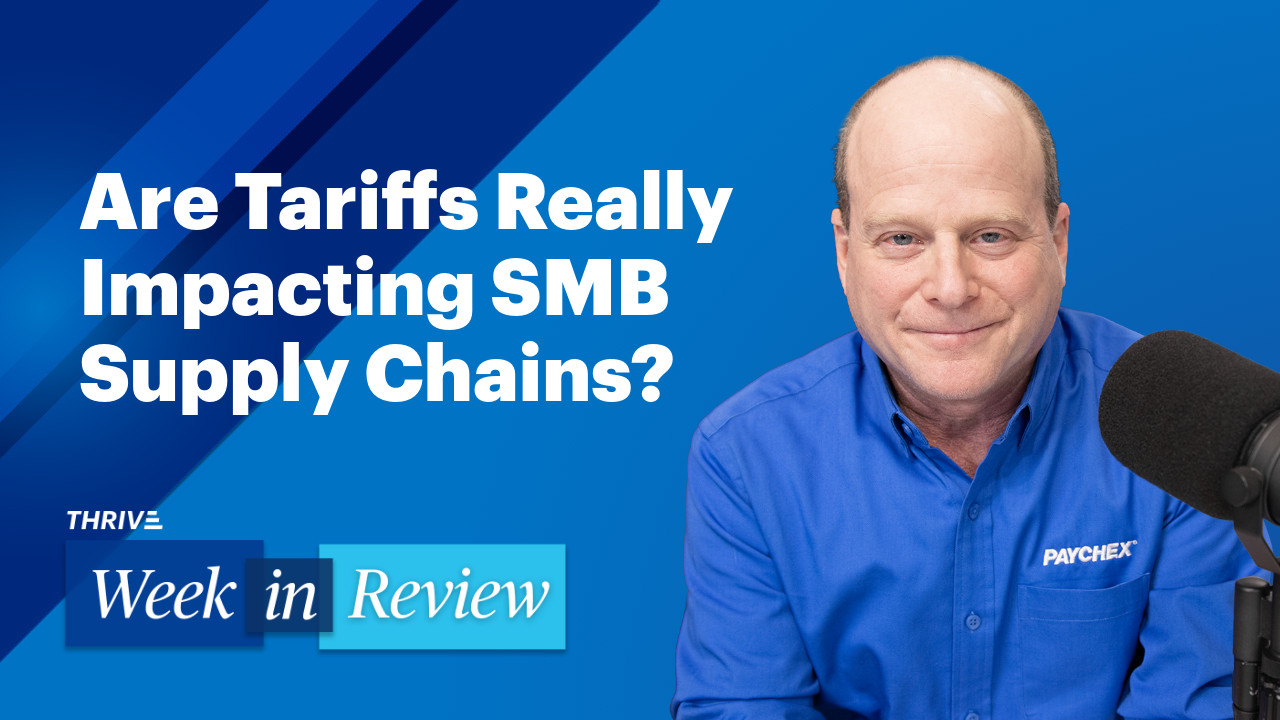- Thrive
-
Temporada
5Episodio36
Los temores de inflación disminuyen, el mercado inmobiliario mejora y los problemas de seguridad en el lugar de trabajo
Podcast •
Vea
Resumen
Reports that consumers’ inflation fears are fading could be good news to small businesses, says Gene Marks, who shares that the monthly Consumer Sentiment Report from the University of Michigan fell 1.5%. Adding more fuel to the fire for an economy seeking better news is the 31.5% increase in housing inventory reported by realtor.com, although Gene tempers this with the knowledge that interest rates for mortgages are still high. In the workplace, a study found that one-third of all injuries happen to first-year employees, but Gene offers that OSHA will provide free safety consultations.
Ver transcripción
Hey everybody, it's Gene Marks, and welcome to this week's episode of the Paychex THRIVE Week in Review where we take a few headlines from the news and talk about how they're impacting your business.
Now, this week I am not going to be talking about the tax legislation because things are still in process in the Senate right now and we still have a ways to go. But, by the way, just bear in mind, Paychex will be doing special webinars – two of them, one for business owners and one from CPAs – on July 23 and July 24 that is going to be unpacking the entire tax legislation. So, if you're interested, check it out and sign up on paychex.com.
In the meantime, we have three news stories that do impact your businesses this week. So, let's get right to them.
The first has to do with inflation. According to a report on Yahoo Finance, America's deepest inflation fears are starting to fade. That is because Americans are feeling better about the path forward with inflation. Now, we know that Inflation numbers were released. The consumer price index was ranging below 3 percent, at about 2% year-over-year, which is great news that inflation is still under control, although a lot of people are still uncertain about the impact of tariffs on inflation moving forward.
But also, the University of Michigan released their monthly Consumer Sentiment Survey and it showed pessimism over the inflation outlook lessened in June as one-year inflation expectations plunged to 5.1% from the more than four-year – four-decade high 6.6 % that we saw in May. Long-run inflation expectations, which check expectations over the next five to 10 years, also fell, hitting 4.1 % in June, down 0.42 % in May. The broader consumer sentiment index rebounded, as well, rising to 60.5 in June, above the 52.2 % seen in May.
Consumers appear to have settled somewhat from the shock of the extremely high tariffs announced in April and the policy volatility seen in the seven weeks that followed, says the survey of consumers Director Joanne Su, she wrote in the release.
So, consumers themselves are now mitigating back, their sentiment has gone up this past month. Their fears of inflation have lessened a little bit – doesn't mean that there won't be inflation impacts from tariffs regardless of how they're resolved – but it seems that consumers are getting a little bit more comfortable. And that is, of course, great news for us as businesspeople.
Whether you're in retail, whether you're a restaurant, it makes no difference. In the end, it's all about the consumer, and as long as consumer sentiment is strong, that is very, very important to make sure that our businesses run good. So, good news from the University of Michigan's Consumer Sentiment Survey.
I also have some more interesting news, as well. This news comes from realtor.com. They reported most active for sale inventory since December of 2019. So, let me tell you what this means. On a weekly basis, realtor.com reported that year-over-year change in active industry and new listings – this what they report on a monthly basis; They report total inventory.
For May, realtor.com reported inventory was up 31.5% year-over-year but, of course, still down 14.4% compared to the 2017 to 2019 levels. But, even so, the number itself is still higher than it was in 2019. These are the highest inventory levels that were recorded since December of 2019.
New listings, a measure of sellers putting homes up for sale, also rose 5.2% year-over-year and the median list price for homes was up about 0.5% year-over-year. So, what does this all mean?
Well, it means that there's more inventory coming on the market, which is to be expected because it is the spring selling season for real estate. But still, those numbers are definitely stronger, strong as they've been since 2019. Home prices themselves have barely changed, but they still remain pretty elevated. So, the question is, with mortgage rates still at about 7% – 6 to 7% – will people come out to buy? I am still not incredibly optimistic about that. And why?
Well, when mortgage rates are between 6 and 7% and you're sitting on a mortgage that you got for 3% or 3.5%, you're not really inclined to double your mortgage expense, your mortgage interest right away unless you were really buying that dream home.
Now, that doesn't mean that people aren't going to be impatient, want to buy that home, want to move forward on other reasons to move. And now there's a lot more inventory available than in the past five years – that's really great news for a lot of both buyers and sellers. But I still think the real impetus, the real thing that will supercharge the real estate industry will be when interest rates, mortgage rates fall.
And those interest rates are all dependent on bond years – 10-year and 30-year Treasury bond yields. They have started to slip a little bit as inflation expectations have slipped, and if we see treasuries start slipping below the four to five percent level that they're at now, that is going to convert into a slippage in mortgage rates, as well, because banks based through mortgage rates on the Treasury bond yields. So, if inflation expectations are coming down and yields start coming down in the Treasury market, we could see mortgage rates start coming down, and I think that will be the impetus for a lot of people to go out and buy.
Why is this important? Because the real estate industry is a multi-billion-dollar industry that impacts small businesses across the country, both directly and indirectly. It's not just the brokers that are selling real estate, but it's also all the individual people from insurance agents and house cleaners and the construction industry and home repair industry and the pool industry – all these different people that get involved when homes turn over.
And again, if you have homes that are selling, it keeps the small businesses in those neighborhoods active as well. I mean, if a pizza shop is running a business and there's empty houses around them, that's not really good for their business. So, all of that would be great news, but we have to continue to watch real estate, the mortgage rates themselves, whether or not they will come down.
But bottom line is, according to realtor.com, active inventory is up and prices are stable for houses. So, that's good stuff. We just need those mortgage rates to drop a little bit to make a difference for people that are impacted by the real estate industry.
My final story this week comes from HR Dive. It comes from a new survey, and the survey found that a third of workplace injuries happen to first-year employees. So, a greater share of American adults think that trade school is a better option for graduating seniors, but it turns out that a lot of people that come into the marketplace and that are getting trained, according to the survey that they're reporting, the younger people are the ones that have actual problems with safety.
So, it's an important number to keep in mind. If you're running a business, a warehouse or a manufacturing, and we hear that a third of those workplace injuries are happening to people in their very first year. I mean, I realize two-thirds happens to everybody else, but geez, a third of the first year. I think that's indicative that a lot of employers need to step up their safety training.
One thing to keep in mind when it does come to safety, bear in mind that OSHA – the Occupational Safety and Health Administration – they offer free consultations. They will visit your business for free and they will point out safety issues and give you advice for safety training for your employees, as well. This is a separate group not connected to their enforcement area. They just do consulting for small businesses, and if you go to OSHA.gov, you can get free consulting for your business to make sure you're safe.
Just be aware when that many employees are saying in their first year that they are that they're having workplace accidents. That's something that we as employers need to address.
My name is Gene Marks, and you have been watching or listening to this week's episode of the Paychex THRIVE Week in Review. We'll be back next week with more help and information and advice and news that impacts your business. So, hopefully you'll tune in and remember, on July 23 and July 24, Paychex will be doing two webinars – one for small business owners and one for CPAs that will address our tax legislation. I will be moderating those webinars with a couple of tax experts.
So, keep that in mind, and as we do the Week in Review, we will keep you up to date on that tax legislation as it progresses through both houses in Congress. Thanks again for watching or listening. We'll see you again next week. Take care.
Do you have a topic or a guest you’d like to hear on THRIVE. Visit payx.me/thrivetopics and send us your ideas or matters of interest. Also, if your business is looking to simplify your HR, payroll, benefits or insurance services, see how Paychex can help. Visit the resource hub at paychex.com/worx. That’s W-O-R-X. Paychex can help manage those complexities while you focus on all the ways you want your business to thrive.
I'm your host, Gene Marks, and thanks for joining us.
This podcast is property of Paychex, Incorporated, 2025.

 Apple Podcast
Apple Podcast Spotify
Spotify iHeartRadio
iHeartRadio









